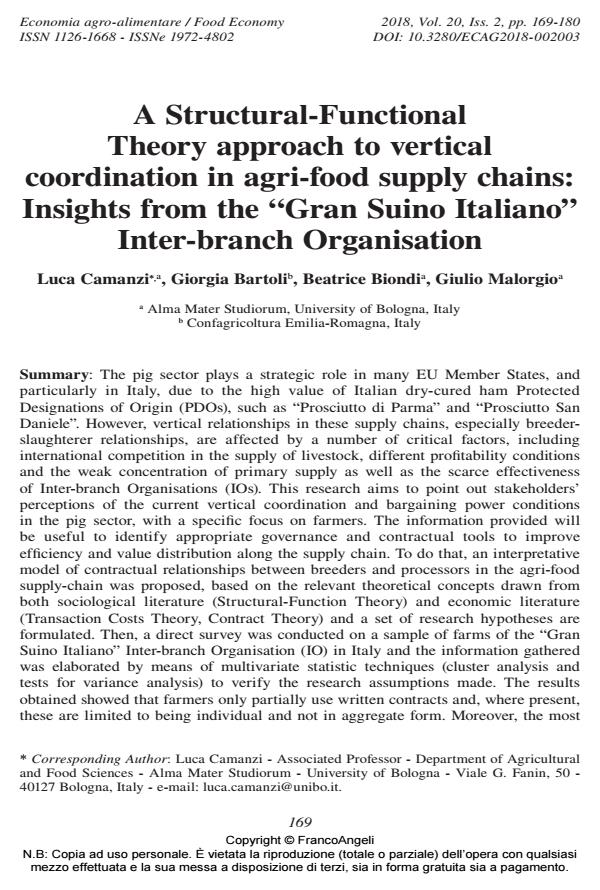A Structural-Functional Theory approach to vertical coordination in agri-food supply chains: Insights from the "Gran Suino Italiano" Inter-branch Organisation
Journal title ECONOMIA AGRO-ALIMENTARE
Author/s Luca Camanzi, Giorgia Bartoli, Beatrice Biondi, Giulio Malorgio
Publishing Year 2018 Issue 2018/2
Language English Pages 12 P. 169-180 File size 175 KB
DOI 10.3280/ECAG2018-002003
DOI is like a bar code for intellectual property: to have more infomation
click here
Below, you can see the article first page
If you want to buy this article in PDF format, you can do it, following the instructions to buy download credits

FrancoAngeli is member of Publishers International Linking Association, Inc (PILA), a not-for-profit association which run the CrossRef service enabling links to and from online scholarly content.
The pig sector plays a strategic role in many EU Member States, and particularly in Italy, due to the high value of Italian dry-cured ham Protected Designations of Origin (PDOs), such as "Prosciutto di Parma" and "Prosciutto San Daniele". However, vertical relationships in these supply chains, especially breederslaughterer relationships, are affected by a number of critical factors, including international competition in the supply of livestock, different profitability conditions and the weak concentration of primary supply as well as the scarce effectiveness of Inter-branch Organisations (IOs). This research aims to point out stakeholders’ perceptions of the current vertical coordination and bargaining power conditions in the pig sector, with a specific focus on farmers. The information provided will be useful to identify appropriate governance and contractual tools to improve efficiency and value distribution along the supply chain. To do that, an interpretative model of contractual relationships between breeders and processors in the agri-food supply-chain was proposed, based on the relevant theoretical concepts drawn from both sociological literature (Structural-Function Theory) and economic literature (Transaction Costs Theory, Contract Theory) and a set of research hypotheses are formulated. Then, a direct survey was conducted on a sample of farms of the "Gran Suino Italiano" Inter-branch Organisation (IO) in Italy and the information gathered was elaborated by means of multivariate statistic techniques (cluster analysis and tests for variance analysis) to verify the research assumptions made. The results obtained showed that farmers only partially use written contracts and, where present, these are limited to being individual and not in aggregate form. Moreover, the most serious problems encountered in the commercial relations with the counterparty are the lack of legal clauses that can protect the weak contractor in the transaction and the lack of shared agreements on the carcass evaluation method and, hence, the determination of the price of the animals sold to the slaughterer. We conclude that the most appropriate solution to improve breeders’ perception of the current weaknesses in vertical coordination with processors could be to introduce a new contract scheme between farmers and processors, with specific features identified on a shared basis by the members of the Inter-branch Organization.
Keywords: Contracts, farmers’ perception, pig meat industry, transaction costs, vertical coordination
Jel codes: Q11, Q13, Q16
- Supply chain networks in the Armenian agribusiness: Setting a benchmark Jon H. Hanf, Silva Atoyan, Linda Bitsch, Taras Gagalyuk, in ECONOMIA AGRO-ALIMENTARE 2/2019 pp.359
DOI: 10.3280/ECAG2019-002010 - Transaction costs economics and geographical indications: a systematic analysis of the literature Franklin de Souza Meirelles, Janaina de Moura Engracia Giraldi, Rodolfo Paião de Campos, in Revista de Economia e Sociologia Rural e264494/2023
DOI: 10.1590/1806-9479.2022.264494 - Governance in the Italian Processed Tomato Value Chain: The Case for an Interbranch Organisation Antonella Samoggia, Francesca Monticone, Gianandrea Esposito, in Sustainability /2022 pp.2749
DOI: 10.3390/su14052749
Luca Camanzi, Giorgia Bartoli, Beatrice Biondi, Giulio Malorgio, A Structural-Functional Theory approach to vertical coordination in agri-food supply chains: Insights from the "Gran Suino Italiano" Inter-branch Organisation in "ECONOMIA AGRO-ALIMENTARE" 2/2018, pp 169-180, DOI: 10.3280/ECAG2018-002003